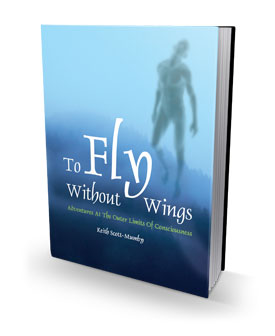It’s one of those sort of things that, well… everyone knows! But what does it mean, to know? How do we know we know? We remember stuff, but is that the same as knowing? Oh no, certainly not…
Philosophers have argued for over 2,000 years about what it means to know something. It’s called “The Problem Of Knowledge”.
Plato and Aristotle took a bite out of it. The so-called skeptics (the group of Greek philosophers around the 5th century BC, not the negate-all twerps on the Internet today) doubted that it could be proved that knowledge is possible. They were very cautious about stating anything was true because, as they argued, how could you prove it?
Even today, with quantum physics dominating our world, there is no way to prove that quantum theory is correct. It works right enough; but we might have the right results from the wrong explanation!
It’s fascinating really, to grapple with problems of the mind at this level.
In my own super-special book “To Fly Without Wings”, I tried to argue with this grumpy fairy creature about whether “real” flying meant that it was witnessed by others, or not. There are whole chapters of argument about what is real and what isn’t. You’ll have to get the book to follow the entertainment and how I coped with flying without wings.
The great sophist Gorgias (485 – 380 BC roughly) challenged the many physicists of the day. He was a professional argumentalist, kinda (made that word up, so don’t bother looking in the dictionary). But you can look up the word rhetoric. It was a dazzling art of those days: skill with weaving words and spinning them into amazing webs of complexity.
The content of the typical physicist/philosopher lectures back then was usually in three parts:
- Things exist
- You can know what things exist
- You can tell others about what exists
Gorgias is reported to have dazzled and delighted his audiences by proving the exact opposites, by using almost identical arguments:
- Nothing exists
- If by chance something did exist, you could not know anything about it
- If you did accidentally learn something about it, there is no way you could communicate your knowledge to others
From which we learn that you can prove almost anything with a clever play of words. Verbal reasoning alone, can be used to prove anything by clever rhetoreticians. Logical and linguistic arguments can tell us nothing “true” about the physical world.
This is the problem of knowledge. How can we know – how can we be certain about – what we know?
Luckily for politicians, advertising and media people, we can’t really. They can spin their lies and we are pressed for a mechanism by which to test what is true.
Of course we can test what they say against what we think we know. But then, it’s back to the main problem: how do we know what we know, how did we come by our knowledge and—most important of all—how do we know it’s correct?
Well, the first step is to ignore the theoretical. What’s practical? There seem to me to be 3 differing positions we can take:
1. I know what I see or her. My perceptions are the standard by which I judge. The problem with this is that your perceptions may be hallucinatory.
2. I know what I know and what’s true for me is true. The problem there is you might zero agreement from other people and you’d find that tough going.
The third position is a major one, historically. Plato called it “justified true knowledge”.
You know what you know—BUT, you have justification for believing it. There is evidence and reasons why.
But then how do you know the evidence is correct?
Well, you’ve tested the evidence against other standards and found it matches.
But how do you know the other standards are correct (flat Earth, remember)? You can see where this is going. It’s fun in one sense. We’re doing rhetoric and philosophy. Hey hey!
But it’s also sort of scary: because nothing is really real; nothing is true in the ordinary sense we use that word; our world is an agreed upon illusion; in fact even thoughts may be just a crazy concept that doesn’t really exist but we are duped into thinking our minds are real!
So now you know what is called “The Problem Of Knowledge”! See if you can drag anyone into a debate about it at a party this Christmas. You’ll probably learn a lot more about your friends than you would discussing the World Series or the new Hobbit movie! And talking of hobbits, elves and wizards…
Back to my consciousness book “To Fly Without Wings” (it’s mostly practical, by the way, not just arguments and words like this). My challenge was this: if I feel myself flying by magic, am I really flying? What if nobody else can see it? I asked my fairy teacher this and he snorted that what other people think is irrelevant: collective “opinion” is not the truth. It’s just agreement.
Then I was forced to challenge the magic man personally: what if YOU are an illusion? I asked him. Maybe only I can see you and talk to you and no other human being would agree that you exist?
I exist for you, he smiled. And you can never prove whether I’m real or not. Does it matter?
So, in the end, I am left wondering: what does knowledge really mean?
I don’t know! (and yes, that’s a joke)

